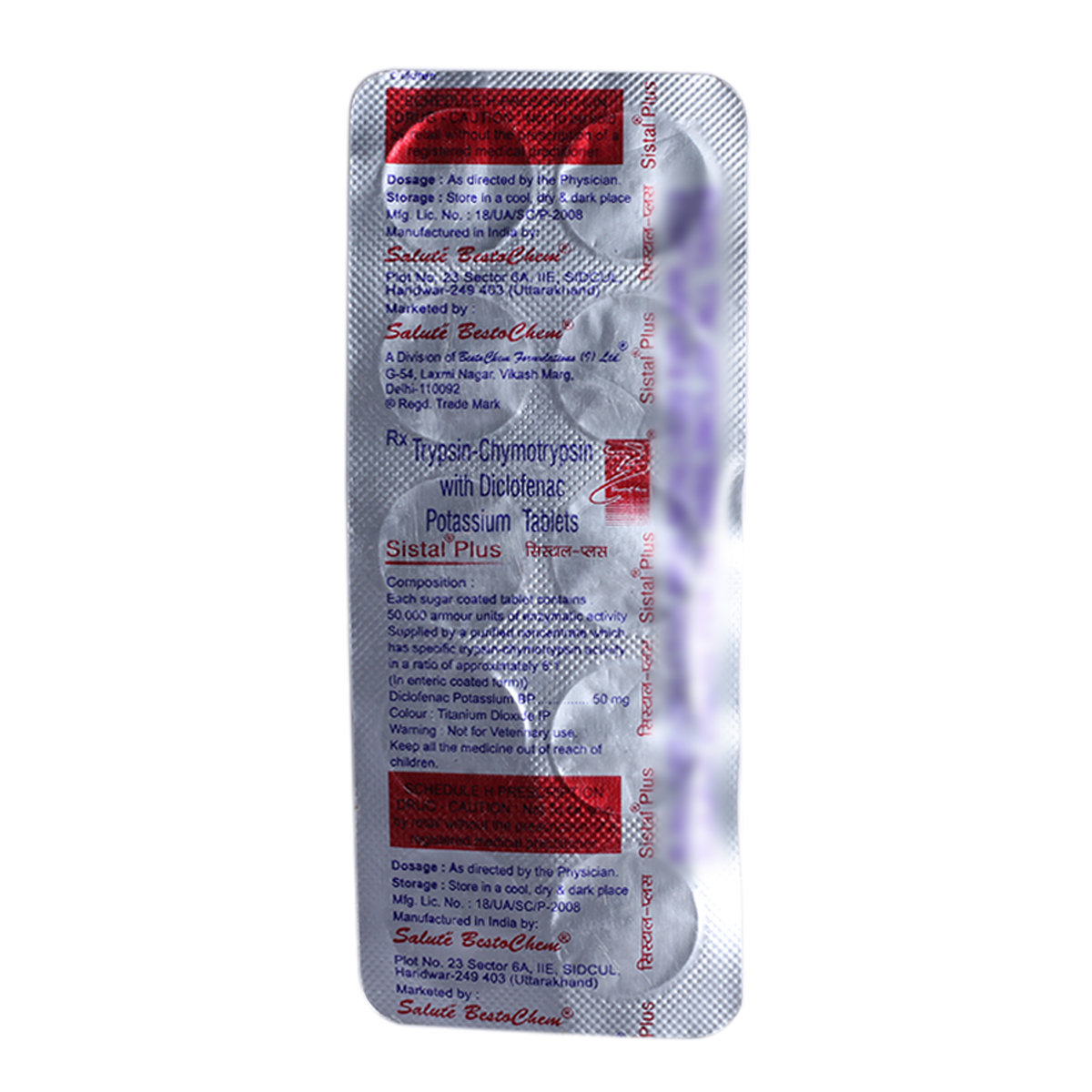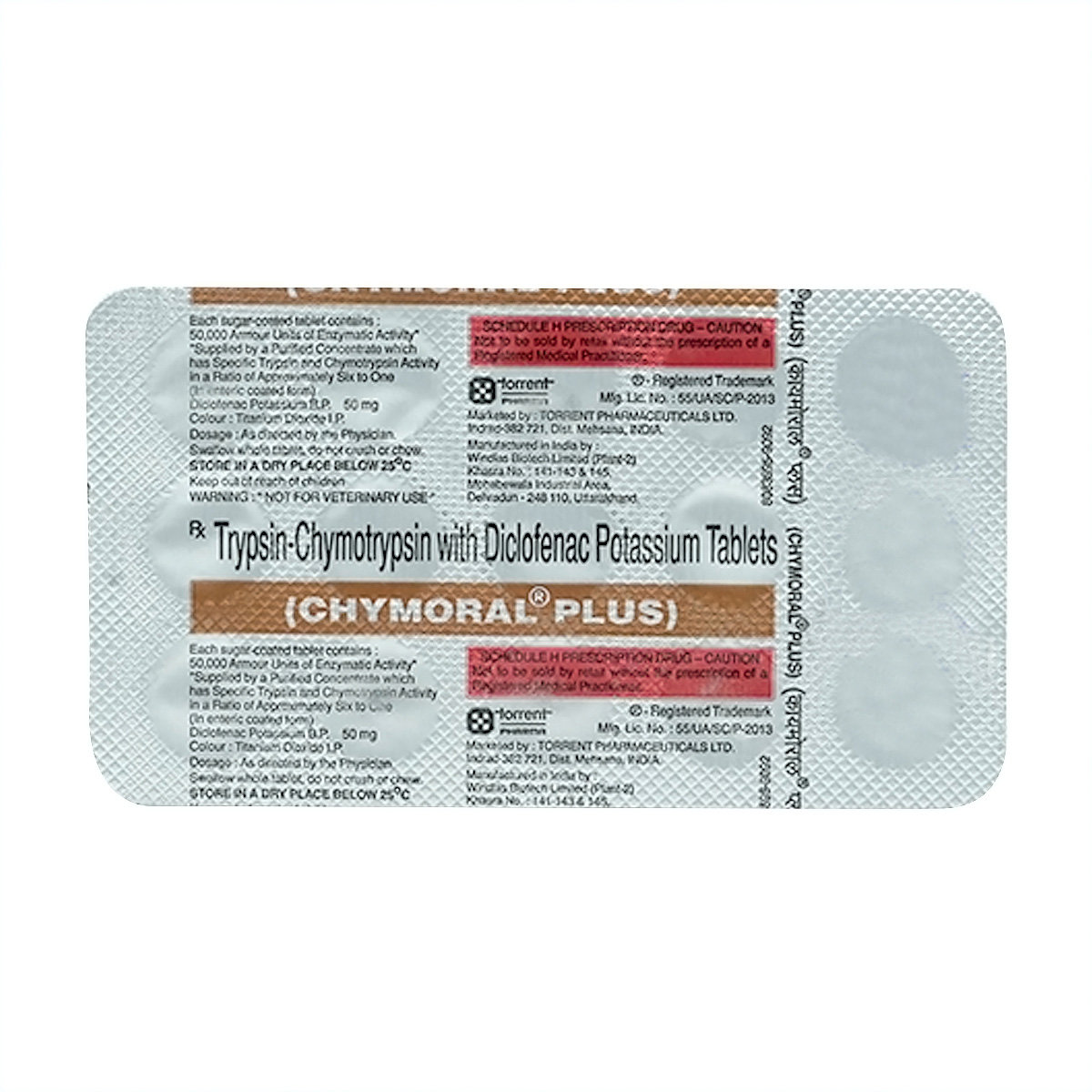- Home
- TRYC-D Tablet
TRYC-D Tablet Substitute
TRYC-D Tablet Substitute
Medicine Composition:
DICLOFENAC-50MG + TRYPSIN CHYMOTRYPSIN-50000IUAll Substitutes & Brand Comparisons
RX
Out of StockChyro D 50mg/50000IU Tablet
₹54.9
(₹4.94 per unit)
38% CHEAPERRX
Out of StockFibrotryp D 50mg/50000IU Tablet
Alchemist Life Sciences Ltd
₹56.18
(₹5.06 per unit)
37% CHEAPERRX
Out of StockChomfit-D Tablet
Biophar Lifesciences Pvt Ltd
₹60.9
(₹5.48 per unit)
32% CHEAPERRX
Out of StockChymobel Plus Tablet
Blubell Pharma
₹69
(₹6.21 per unit)
22% CHEAPERRX
Out of StockFinipsin 50mg Tablet
₹72
(₹6.48 per unit)
19% CHEAPERRX
Out of StockChymovos D 50mg Tablet
₹73
(₹6.57 per unit)
18% CHEAPERRX
Out of StockTrydic D 50mg/50000IU Tablet
₹74
(₹6.66 per unit)
17% CHEAPERRX
Out of StockKymozen-D Tablet
Axis Life Science Pvt Ltd
₹75
(₹6.75 per unit)
16% CHEAPERRX
Out of StockK TRIP PLUS TABLET 10'S
Abbott India Ltd
₹78.3
(₹7.05 per unit)
12% CHEAPERRX
Out of StockChymobid Plus 50mg/50000IU Tablet
Innovative Pharmaceuticals Pvt Ltd
₹79.5
(₹7.16 per unit)
11% CHEAPERRX
Out of StockChymofast-D Tablet 10's
Axis Labs (P) Ltd
₹80
(₹7.2 per unit)
10% CHEAPERRX
Out of StockTripsan D Tablet
BMW Pharmaco India Pvt Ltd
₹127.5
(₹7.65 per unit)
5% CHEAPERRX
Out of StockChetre D 50mg Tablet
Soigner Pharma
₹89
(₹8.01 per unit)
RX
Sistal Plus Tablet 10'S
Salute Bestochem
₹128
(₹11.52 per unit)
42% COSTLIERRX
Chymoral Plus Tablet 15's
Torrent Pharmaceuticals Ltd
₹224
(₹13.44 per unit)
66% COSTLIER

When Should You Consider Switching from TRYC-D Tablet?
Patients may explore substitutes in the following scenarios:
- High monthly cost of TRYC-D Tablet
- Non-availability in local pharmacies
- Generic recommendation by a doctor
- Side effects or better tolerability with alternatives
What to Know Before Switching
Before you switch from TRYC-D Tablet to another medicine, here are some important points to keep in mind:
Same salt, different brands:
Most substitutes contain the same active ingredient - DICLOFENAC-50MG + TRYPSIN CHYMOTRYPSIN-50000IU, but the fillers, coating, or manufacturing quality may vary slightly.
Consult your doctor first:
Even if the salt is the same, your doctor can confirm if the substitute is right for your condition, dosage, and health history.
Watch out for allergies or reactions:
Some people may react differently to certain brands due to inactive ingredients. If you notice any side effects, inform your doctor immediately.
Price ≠ effectiveness:
A lower-priced substitute doesn't mean it's less effective. Many generic medicines work just as well as branded ones.
Check the dosage form and strength:
Always match the substitute’s strength (e.g., 5mg, 10mg) and form (tablet, capsule, syrup) with what your doctor prescribed.
Uses
TRYC-D Tablet is used to reduce pain, inflammation, and swelling associated with various musculoskeletal and post-operative conditions. The detailed uses of TRYC-D Tablet are as follows:
- Musculoskeletal pain: TRYC-D Tablet reduces discomfort caused by muscle strains, sprains, or joint injuries.
- Osteoarthritis and rheumatoid arthritis: TRYC-D Tablet helps in reducing joint pain and inflammation in degenerative and autoimmune joint disorders.
- Post-operative pain and swelling: TRYC-D Tablet is effective in reducing inflammation and swelling following surgical procedures.
- Relief from sports injuries: TRYC-D Tablet helps in quicker recovery from tissue injuries and swelling caused by physical exertion.
- Dental pain and swelling: TRYC-D Tablet reduces discomfort and inflammation caused by dental procedures or infections.
Medicinal Benefits
TRYC-D Tablet is a combination of two drugs: Diclofenac and Trypsin-chymotrypsin. TRYC-D Tablet is used to relieve pain and inflammation associated with osteoarthritis, rheumatoid arthritis, ankylosing spondylitis, muscle pain, and bone and joint pain. Diclofenac is an NSAID (Non-Steroidal Anti-Inflammatory Drug) which works by blocking the effect of chemical messengers called prostaglandins by inhibiting cyclooxygenase (COX) enzymes, thereby reducing mild to moderate pain and inflammation at the injured or damaged site. Trypsin-chymotrypsin is a combination of enzymes that breaks down the abnormal proteins at the site of inflammation, thereby reducing swelling and inflammation by increasing the blood supply at the affected area.
FAQs
The substitutes of TRYC-D Tablet contain the same active salt(s) - DICLOFENAC-50MG + TRYPSIN CHYMOTRYPSIN-50000IU. However, they may differ in price, manufacturing quality, and inactive ingredients. Speak to your doctor to find a suitable option.
Switching to a generic substitute medicine in the place of TRYC-D Tablet is often possible if it has the same salt, strength, and dosage form. But always check with your doctor before making any changes to your medication.
Generics versions of TRYC-D Tablet are typically more affordable because they don’t include the original brand's research, development, and marketing costs. They contain the same active ingredient and are approved for safety and effectiveness.
Most people don’t notice any difference. However, some may react to different fillers or coatings. If you notice any unusual symptoms after switching, consult your doctor.
Make sure the new medicine has the same active salt, strength, dosage form. Always confirm the change with your doctor or pharmacist.
Substitutes of TRYC-D Tablet meet the same safety and efficacy standards as TRYC-D Tablet, but small differences in absorption or formulation can exist. A doctor can help you choose the right one for your needs.
Yes. Substitutes of TRYC-D Tablet may vary in color, size, or shape due to differences in manufacturing and branding, but this does not affect how they work.
Yes, it’s generally safe to switch between multiple substitutes of TRYC-D Tablet if they have the same salt and strength. However, always inform your doctor so they can monitor how your body responds.
Yes, many people safely use substitutes of TRYC-D Tablet for long-term treatment. Just ensure it’s done under medical supervision.
If your symptoms stay under control or lab results remain stable, the substitute for TRYC-D Tablet is likely working well. Regular follow-ups with your doctor are important.
Absolutely. Even with the same salt, small differences can affect how your body responds when switching from TRYC-D Tablet to its substitute. Always consult your doctor before switching.
TRYC-D Tablet is a combination medicine used to relieve pain and inflammation associated with osteoarthritis, rheumatoid arthritis, ankylosing spondylitis, muscle pain, and bone and joint pain.
TRYC-D Tablet works by inhibiting the action of chemical messengers responsible for pain and inflammation at the injured or damaged site. It also aids in the reduction of swelling and inflammation by dissolving abnormal proteins at the site of inflammation.
TRYC-D Tablet is used to reduce and relieve pain and inflammation associated with osteoarthritis, rheumatoid arthritis, and ankylosing spondylitis. Arthritis is tenderness and swelling in the joints.
Do not take other pain relievers, such as NSAIDs, with TRYC-D Tablet unless prescribed by a doctor, as this may increase the risk of side effects.
Avoid exceeding the dose and duration advised by the doctor. TRYC-D Tablet should not be taken for longer durations unless prescribed by your doctor.
Avoid taking TRYC-D Tablet if you have ulcers in the stomach or intestines, bleeding problems, or heart problems. Talk to your doctor if you have any concerns.
Taking a higher than the recommended dosage of TRYC-D Tablet is not advisable. It may increase the risk of side effects, such as vomiting, stomach pain, and bleeding. Please follow the recommended dosage and consult your doctor before making any changes.
The use of TRYC-D Tablet is contraindicated in patients who are allergic to any of its ingredients. It should also be avoided in individuals with severe heart problems, stomach ulcers or perforations, bleeding disorders (such as bleeding from the stomach, intestine, or brain), a history of bypass surgery, heart attack, blood circulation issues, or inflammation of the intestines.
It is unlikely that you will become addicted to TRYC-D Tablet, as it does not have addictive properties. However, long-term or excessive use of TRYC-D Tablet may lead to serious side effects. It is important to use this medication exactly as prescribed by your doctor.
TRYC-D Tablet is used for short-term relief of pain and inflammation, so you can stop taking it once it is relieved. But always double-check with your doctor or healthcare provider to confirm.
TRYC-D Tablet (especially due to its component diclofenac) may cause dizziness as a side effect in some people, particularly when taken in higher doses or with prolonged use. Avoid driving or operating machinery if you feel dizzy after taking TRYC-D Tablet. Please consult your doctor if the dizziness persists.
The use of TRYC-D Tablet can cause kidney damage if taken in high doses or for a long time. Normally, the kidneys produce prostaglandins, a chemical that helps protect them from damage. Prolonged use of TRYC-D Tablet reduces the levels of prostaglandins, increasing the risk of kidney damage. If you have a history of kidney problems, please consult your doctor, as they may need to adjust your dosage.
TRYC-D Tablet usually starts working within an hour after taking it. However, the onset of action may vary depending on individual response and the severity of the condition. If you do not feel any improvement in symptoms after taking TRYC-D Tablet, please inform your doctor.
If you forget to take TRYC-D Tablet, take it as soon as you remember, unless it is almost time for your next dose. In that case, skip the missed dose and continue with your regular schedule. Do not take two doses at once.
The common side effects of TRYC-D Tablet include nausea, vomiting, stomach pain, loss of appetite, indigestion, and diarrhoea. Most of these side effects do not require medical attention and will resolve gradually over time. However, if the side effects persist or worsen, please consult your doctor.





